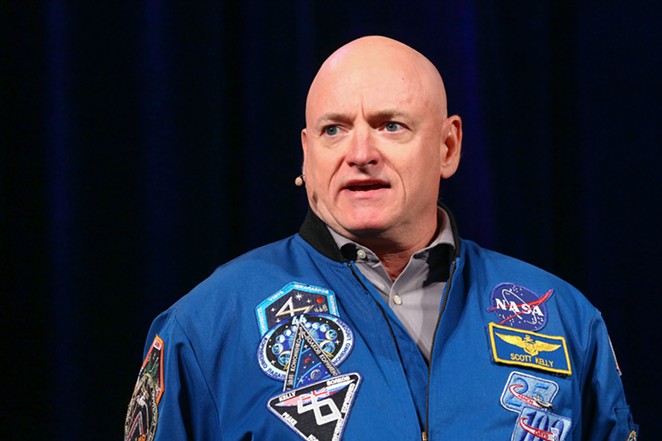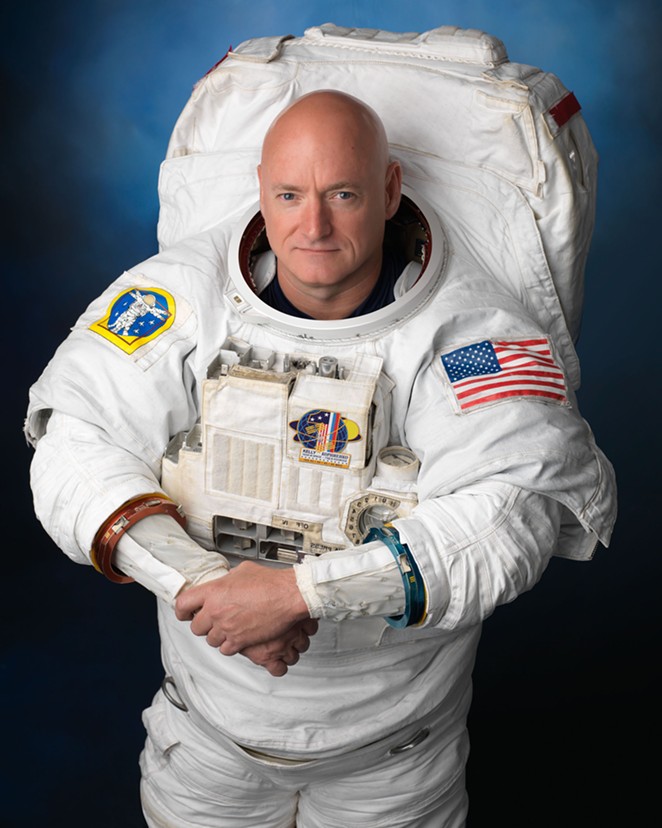In 2015, Scott Kelly made headlines for his groundbreaking year living on the International Space Station (ISS), in which he and his earthbound twin Mark Kelly participated in a first of its kind comparative study looking at the effects of spaceflight on the human body.
After his return to Earth in March of 2016, Kelly retired from NASA, but he's not one to rest on his laurels. He's served as the United Nations Champion for Space, written the compelling memoir Endurance: A Year in Space, a Lifetime of Discovery and now travels the country to educate people with his lecture series The Sky is Not the Limit: Lessons From a Year in Space, which will bring him to San Antonio next Wednesday.
Before he heads to the Alamo City, we caught up with Kelly over the phone to ask him a few burning questions of our own.
As with most scientific ventures, your comparative study with your brother Mark seems to have raised more questions than answers. What gaps in our knowledge of the human body do you think we still need to address before we can deem it safe to send people on future long-term missions, like to Mars?
Well, first of all, let me clarify that I am not a scientist — I was a scientific research subject. I performed other people's science on the space station, but keep in mind if I talk about the science I am not talking about it as if I am the principal investigator. As an example, when I was on the space station for a year there were over 400 experiments going on over the course of that year, and you can’t be knowledgeable on all of them, or at the level that the person that this is their experiment.
Now having said that, I can make some general comments on what I think physically we’re going to have to understand more about with going to Mars. I think most of it involves the effects of the environment on us at a genetic level, and I think most of that is due to the radiation. There could be other impacts on our genetics based on microgravity or stress, but I would guess that the biggest genetic impact is radiation, and the amount of radiation you get going to Mars is about ten times what I got in the course of my spaceflight career.
I think there’s other things we need to understand about that before we put people in that kind of radiation environment, or maybe we realize that we need to find a way to protect them from the radiation so it’s not as big of a concern. There are ways to do that: one is some type of radiation shielding, and the other potentially is you just get there a lot faster than their current plans.
Companies like SpaceX and Virgin galactic have made major strides toward expanding spaceflight into the commercial sphere. What excites you about these ventures, and what trepidations do you have about them?
Well, I think it’s great when people want to invest in something that you think is important, and when you have people investing money to expand access to space and space commerce, I think it’s a great thing. I have no complaints. I like following what they do and I hope for their success.
What do you miss most about living on the ISS?
I miss the people that I was there with, my crewmates, and a job where it’s really important what you’re doing — a job where your attention to detail and focus and doing something the right way can have life and death consequences. It’s not the floating or the zero gravity or the view. I mean, I miss those, but not nearly as much as I do the teamwork and working on something that is important with very significant consequences of not doing your job well.
$29.50-$150, 7:30 p.m. Wednesday, January 22, H-E-B Performance Hall, Tobin Center for the Performing Arts, 100 Auditorium Circle, (210) 223-8624, tobincenter.org.
Get our top picks for the best events in San Antonio every Thursday morning. Sign up for our Events Newsletter.



